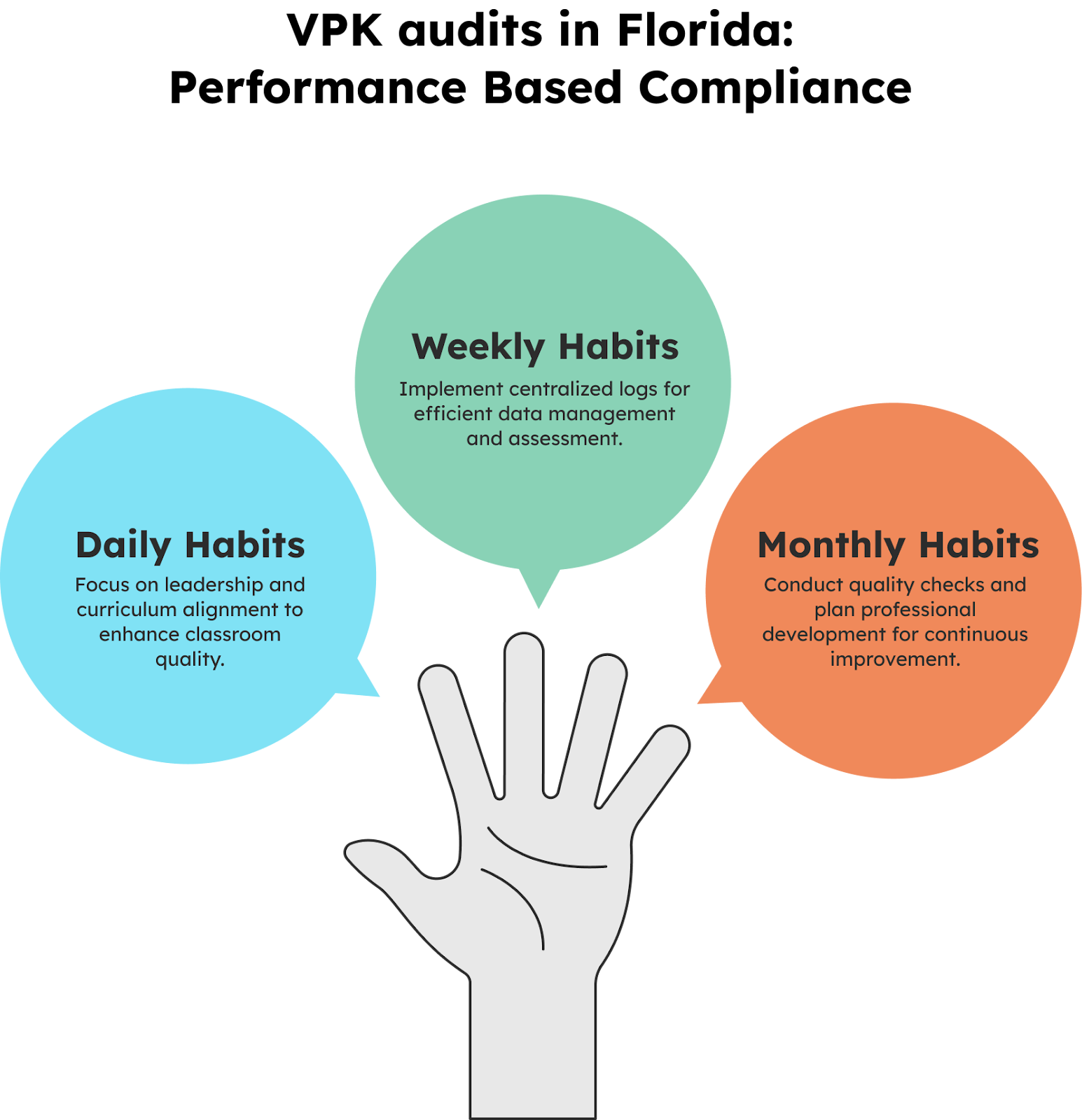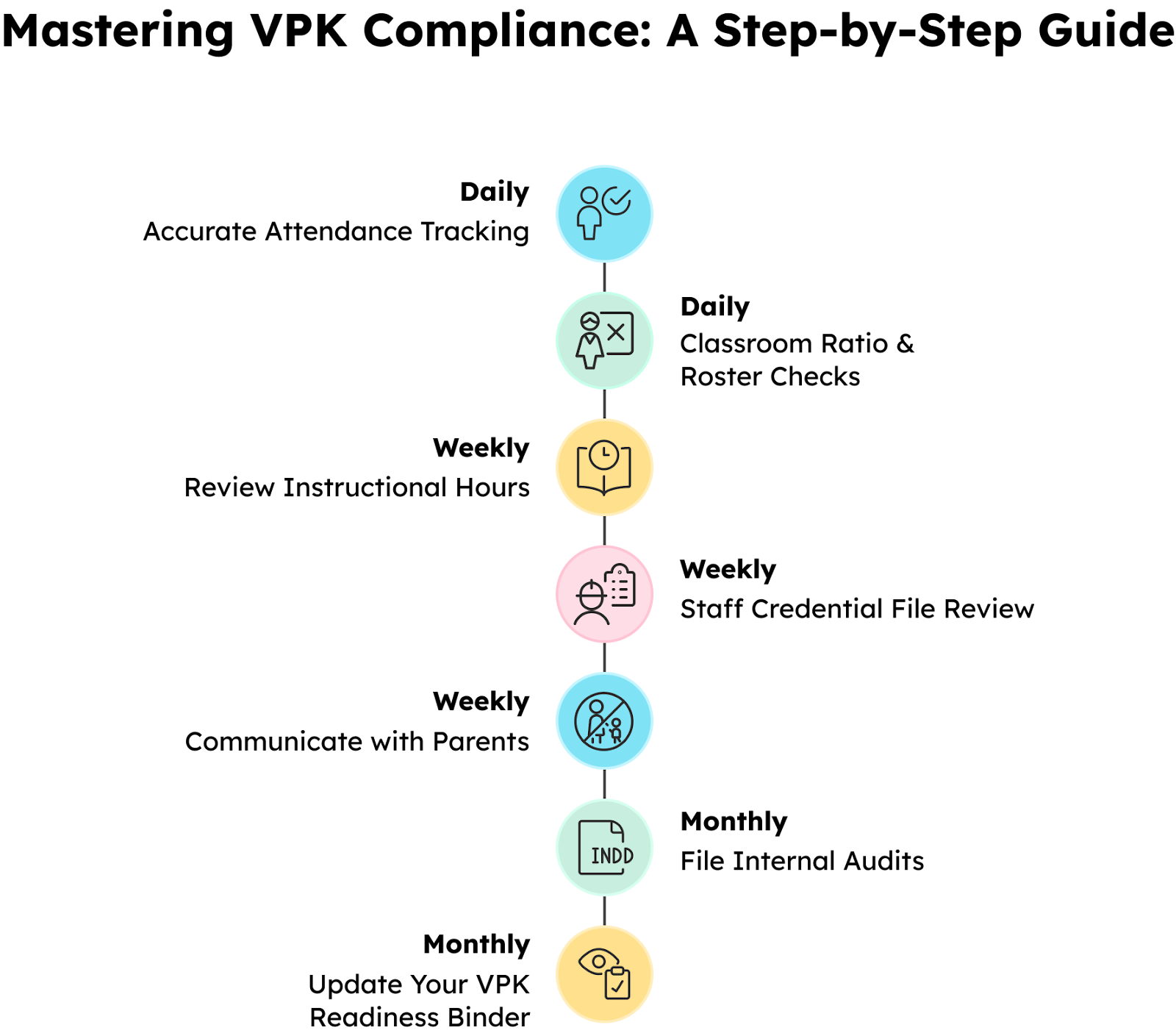If my 40 years in early childhood education have taught me one thing, it’s this: you can’t afford to treat VPK compliance like a seasonal chore.
I’ve seen too many programs scramble at the last minute—digging through folders, chasing signatures, and hoping the audit doesn’t catch what they already know is missing.
It doesn’t have to be that way.
When you build simple, smart routines into your school’s weekly and monthly rhythm, audit season becomes just another Tuesday. And more importantly, you turn compliance into an asset—not just a checklist.
Let’s break down how to stay ahead of Florida’s VPK audits so you can protect your funding, support your teachers, and keep your focus where it belongs: on the children in your care.
Why VPK Audit Readiness Matters
Florida’s Voluntary Prekindergarten (VPK) program is a fantastic opportunity for families and schools. But it comes with very specific requirements, particularly around attendance, instructional hours, staffing credentials, and timely reporting. If these aren’t buttoned up, your program could face:
- Financial penalties or payment delays
- Corrective action plans
- Loss of VPK eligibility
- Serious stress and reputational risk
But that’s only half the story.
Here’s what most administrators fail to even consider- being audit-ready isn’t just about sidestepping stress and safeguarding payments. It’s about positioning your school as a place of quality—where children learn, teachers feel empowered, and families trust they’ve made the right choice.
When you go beyond the bare minimum, you're not just protecting your license. You're unlocking access to funding, performance-based incentives, and tools that can help your teachers grow and your program stand out:
- Access to performance-based incentives like designation differentials (up to 15% higher funding per student)
- Eligibility for quality improvement grants and TEACH scholarships to help staff earn degrees and reduce burnout
- Higher staff morale and retention when teachers are supported and upskilled
- A reputation for excellence in your community, increasing enrollment through word-of-mouth
So don’t just prepare for audits to avoid penalties. Prepare because doing so makes your school better—for your team, your families, and most importantly, the children in your care.
How to Prepare for VPK Audits: Daily, Weekly, and Monthly Habits to Adapt
Over the years, I’ve learned that there will always be variables outside your control. You can’t control how tough an auditor decides to be. But what matters most is how well you’ve built systems that make sure nothing slips through the cracks.
If you put the right daily, weekly, and monthly habits in place—you won’t just survive audit season… you’ll breeze through it.
Florida’s VPK oversight focuses on two key areas: compliance and performance. To stay audit-ready, you need systems in place for both.

If I were to start over today, here’s exactly how I’d go about it:
A. Avoiding performance-based penalties
Performance-based issues typically arise when a center falls below the state’s minimum benchmarks for child progress and classroom quality.
Providers who don’t meet these thresholds may be placed on probation. And if no improvement is observed thereafter, the centre risks losing eligibility altogether.
But you can stay ahead of these penalties with these habits:
Daily Habits
1. Lead with purpose
Your leadership style plays a pivotal role in the success of your childcare centre:
- Use a curriculum aligned with Florida’s Early Learning Standards. Focus on activities that build language, math, and social-emotional skills.
- Check in with your lead instructors daily. Encourage reflection, share small wins, and keep the teaching energy high.
- Pop into classrooms, offer feedback, and ensure instruction is developmentally appropriate.
Weekly Habits
1. Create centralized logs
Implementing a centralized system for data and information is half the battle won:
- Create detailed lesson plans that follow and align with your chosen curriculum. Tie learning goals back to assessment criteria and define evaluation metrics for each goal or learning outcome.
- Encourage staff to jot down quick observations or milestone moments. These informal notes make formal assessments easier.
Talk about killing 2 birds with 1 stone!
Monthly Habits
1. Run internal quality checks
- Use the CLASS tool or another observation rubric to assess classroom interactions.
- Check assessment readiness by monitoring internal assessment tools and student progress logs.
2. Plan professional development
- Identify areas where your team needs support—whether that’s early literacy, classroom management, or child assessments.
- Carve out time for short peer observations or topic refreshers to keep instructional quality strong.
Important Note: Programs that show consistent improvement and high-quality instruction are eligible for higher per-child payments through Florida’s designation differential program.
B. Preventing compliance violations
Compliance issues typically relate to documentation, staffing, ratios, and required hours. These are the areas that show up most during VPK audits—and they’re also the easiest to control if you’re organized.

Daily habits
1. Accurate attendance tracking
DCF and VPK are meticulous about attendance. That means:
- Parents must sign in/out daily on approved VPK attendance forms (not digital unless your county allows it).
- Make sure names are legible, full signatures are used, and no days are missed or corrected without initials.
- Have a system in place to double-check forms each afternoon before filing.
2. Classroom ratio & roster checks
- Confirm that your class roster matches who’s present each day.
- Be sure lead VPK instructors meet credential requirements and are not substituted without proper documentation.
Weekly habits
1. Review instructional hours
Florida VPK programs must meet a minimum number of instructional hours—either 540 hours during the school year or 300 hours during summer.
- Track time lost to closures, holidays, or absences.
- If hours dip too low, document your plan for make-up days and communicate that to families and your coalition.
2. Staff credential file review
- Double-check that teaching staff are currently on required credentials (CDA, FCCPC, Bachelor’s, etc.)
- Ensure you have copies of training transcripts, certificates, and DCF background screenings.
3. Communicate with parents
- Remind families about the importance of daily attendance and accurate signatures.
- Give them a heads-up about audit season so they’re on board and informed.
- Automate weekly reminders for missed days or missed signatures.
Monthly habits
1. File internal audits
Set aside 30 minutes each month to review:
- Attendance sheets
- Roster-to-ratio compliance
- Staff credential documentation
- Documentation of instructional hours
2. Update your VPK readiness binder
Auditors may ask for a readiness binder or digital folder that includes:
- Master student roster
- Signed parent agreements
- Weekly lesson plans
- Teacher credentials
- Attendance logs and VPK forms
- Master VPK student roster
- Signed parent agreements for every child
- Daily attendance forms (no blanks, full signatures, corrections initialed)
- Staff credentials (CDA, FCCPC, Bachelor's + DCF background clearance)
- Weekly lesson plans, tied to Florida Early Learning Standards
- Instructional hour logs (including closures/make-up plans)
- Readiness binder or digital folder, fully updated
Are VPK Audits the Same Across Florida?
Here’s the nuance:
- The rules are statewide, administered by the Office of Early Learning and your local Early Learning Coalition (ELC).
- The enforcement and inspection process may vary slightly from coalition to coalition. Some are more relationship-driven, others more by-the-book.
- What’s consistent: They expect you to be ready. And if they find a problem, you may be subject to financial reconciliation or even loss of provider status.
That’s why it’s wise to connect with your local coalition regularly. Ask for a checklist. Attend their workshops. Build rapport. The more you know about how your local office handles things, the better you can prepare.
Final Tips to Stay VPK-Audit Ready
- Keep a running “VPK Audit To-Do” list on your office wall.
- Assign a team member to help maintain VPK files and prep paperwork.
- Create a monthly calendar alert for internal checks.
- If something doesn’t look right, whether it's attendanceits—attendance, hours, or staffing—document your plan to fix it.
- And if you’re ever unsure, reach out to your coalition contact before it becomes an issue.
In Closing
The key to avoiding audit headaches isn’t working harder—it’s working smarter. A few small routines, built into your weekly and monthly rhythm, can make all the difference.
You already do the big work: creating a safe, nurturing, and inspiring space for young children to learn and grow. Staying DCF and VPK compliant shouldn’t take away from that, rather—it should support it.
Let your systems do the heavy lifting, so when audit time comes, you’re not anxious… you’re ready.









